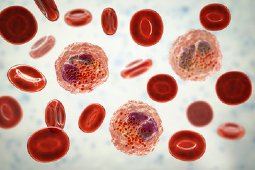
Research shows that mindfulness practice can reduce pro-inflammatory biomarkers related to illness onset and disease progression. Little is known, however, about how meditation-induced changes in inflammation are connected to brain activity. Mindfulness training can reduce fear in response to threat by reducing activity in the amygdala. It can also increase or decrease response to various rewards by modifying activity in the ventral striatum. Fear reduction and reward enhancement are important aspects of how mindfulness facilitates well-being.
Dutcher et al. [Psychoneuroimmunology] studied whether meditation-induced changes in brain activity were correlated with changes in pro-inflammatory biomarkers among breast cancer survivors.
The researchers assigned 22 female breast cancer survivors who had completed primary treatment (average age = 47 years; 60% white) to a Mindfulness Awareness Practices program developed by the UCLA Mindful Awareness Research Center. Participants met in weekly 2-hour groups over 6 weeks.
Class sessions included didactic material on mindfulness, relaxation, and mind-body relationships, and experiential practice with a variety of meditation techniques to cultivate positive emotions.
Participant blood was collected by venipuncture before and after intervention to quantify levels of two pro-inflammatory biomarkers, the cytokine Interleukin-6 (IL-6) and C-reactive protein (CRP). Participants also underwent fMRI brain scans before and after intervention.
Participants engaged in two tasks while being scanned. The first task, intended to stimulate amygdala activity, was a threat reactivity task involving viewing images of threatening facial expressions interspersed with an emotionally neutral task. The second, intended to stimulate ventral striatum activity, was a reward reactivity task involving viewing positively emotionally-toned images of landscapes, sunsets, smiling faces interspersed with neutrally emotionally-toned images of common household objects.
Results showed the women reported significantly decreased depression (d=-0.57) and increased subjective well-being (d=0.57) after intervention. Right amygdala activity in response to threatening images significantly decreased after intervention (d=-0.49). Left ventral striatal activity in response to the landscapes and sunsets significantly increased after intervention (d=0.54).
There were no significant changes in IL-6 or CRP levels after intervention; however, there was a significant association between increases in left ventral striatal activity and changes in IL-6 and CRP. That is, the greater the increase in left ventral striatal activity to landscapes and sunsets, the lower the IL-6 (β=-1.64) and CRP levels (β=-3.07).
The study shows that a mindfulness training program delivered to breast cancer survivors in a group format is associated with changes in brain activity in the amygdala and ventral striatum immediately after intervention. Increased ventral striatal reactivity to positively emotionally-toned nature images inversely correlated with pro-inflammatory markers.
The study lacked a control group, had a small sample size, and included group social support, thus limiting any interpretation of causa
Reference:
Dutcher, J. M., Boyle, C. C., Eisenberger, N. I., Cole, S. W., & Bower, J. E. (2021). Neural responses to threat and reward and changes in inflammation following a mindfulness intervention. Psychoneuroendocrinology, 125, 105114.
[Link to study]